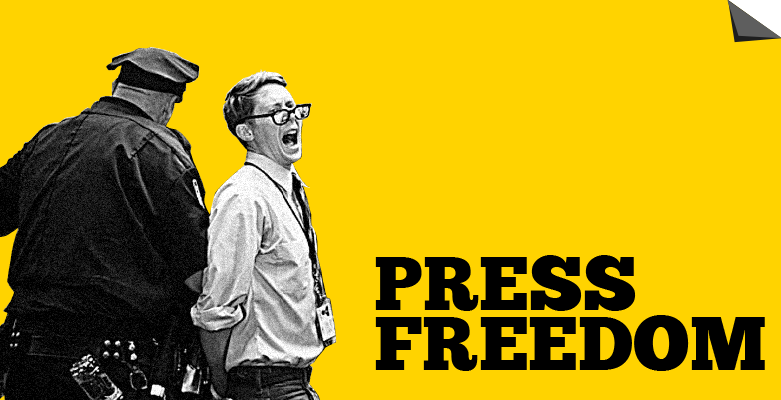
New Struggles in the Fight for Press Freedom
This week the British Parliament held an anti-terrorism hearing and the main witness was a newspaper editor, Alan Rusbridger.
Rusbridger’s paper, the Guardian, has been under enormous pressure from U.K. authorities for its reporting on U.S. and U.K. mass surveillance programs. Indeed, the partner of former Guardian journalist Glenn Greenwald was detained at London’s Heathrow Airport under a U.K. anti-terror law last summer for carrying documents related to NSA whistleblower Edward Snowden.
The hearing began with the committee chairman, Keith Vaz, asking Rusbridger if he “loved his country.” It only got more bizarre from there.
Another member of Parliament, Michael Ellis, suggested that publishing stories based on the Snowden leaks was akin to treason. He asked Rusbridger, “If you’d known about the Enigma Code during World War II, would you have transmitted that information to the Nazis?”
It would be easy to laugh at the implications of this line of questioning if the outcomes for press freedom were not so serious. Not long after the hearing, Reuters reported that Britain’s senior counter-terrorism officer and British police are “examining whether Guardian newspaper staff should be investigated for terrorism offenses over their handling of data leaked by Edward Snowden.” This isn’t that far off from the troubling suggestions the NSA chief made here in the U.S. a few weeks ago.
Rusbridger noted in an interview with the Washington Post that these actions are “clearly designed to be intimidatory and/or chilling.” In the U.K. and to some extent here in the U.S., the attacks on journalists reporting on surveillance threaten to curtail public debate.
“It is not the role of politicians or civil servants to determine the limits of public discussion,” Rusbridger said in the interview. “Nor should the debate be circumscribed by attempting to criminalize the act of journalism — without which, in this instance, there could be no debate. As we’ve said all along, the state has a duty to protect free speech as well as security.”
The question we face today is how journalists and the public should respond when the state has abdicated its responsibility to protect freedom of speech and the press. It’s a question with both national and international implications.
On the eve of the U.K. hearing, a coalition of U.S. news organizations led by the Reporters Committee for Freedom of the Press sent a strongly worded letter to the British Parliament calling on it to “use the occasion of Mr. Rusbridger’s appearance to reaffirm Britain’s commitment to a vigorous, free and independent press.”
This kind of global press solidarity is increasingly important as the forces that oppose freedom of expression are global in nature. Governments are collaborating across borders to spy and share information on people and U.S. companies are selling spying technology to repressive regimes to monitor and track down journalists, dissidents and political opponents.
“These aggressive actions intimidate journalists and their sources,” the letter said. They also chill reporting and embolden others who threaten press freedom abroad. The letter cites U.N. Special Rapporteur Frank La Rue, who has argued that the U.K.’s actions toward the Guardian “provide encouragement to non-democratic regimes to justify their own repressive actions.”
All of this comes just days after the Committee to Protect Journalists hosted the 2013 International Press Freedom Awards. Most of the recipients this year face regular threats for the work they do in countries like Ecuador, Egypt, Turkey and Vietnam. So it was notable that the lifetime achievement award for press freedom advocacy went to Paul Steiger, founding editor-in-chief of ProPublica. This year, for the first time ever, the Committee to Protect Journalists did an in-depth analysis of threats to press freedom in the United States.
In his acceptance speech, Steiger was clear that we must be attentive to the fight at home if we are to advocate for press freedom abroad.
“If we are going to be credible admonishing abusers of journalists abroad,” he said, “we can’t stand silent when it is going on at home.”
There has been an important shift in the fight for press freedom over the last six months. This fight is increasingly global in scope, participatory in nature and intertwined with digital rights and Internet freedom.
These shifts demand new strategic alliances and new kinds of advocacy, but they also represent an opportunity to engage new people and highlight new voices in the struggle for freedom of expression.